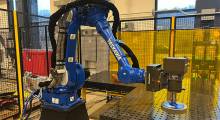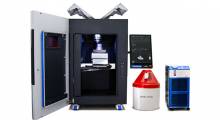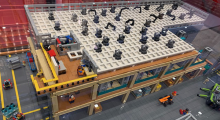Optomec announces its LENS Directed Energy Deposition (DED) 3D Printed Metal system will be used to print bi-metallic rocket engine parts that will go to the moon in 2024 as part of a grant from NASA for additive manufacturing research and education as it relates to space technology and applications.
Work on this grant is a collaboration between the Navajo Technical University (NTU), who is acting as the lead on the project, with the Marshall Space Flight Center Advanced Manufacturing Center (MSFC), University of Alabama Huntsville (UAH), V&M Global Solutions and Optomec. The team will collaborate on additive manufacturing research around directed energy deposition (DED) of bi-metallic parts for NASA applications and build institutional capacity in STEM research and education.
“We’re very excited to be working with this team and NASA to explore how the benefits of Additive Manufacturing can be applied to space exploration, says Tom Cobbs, Optomec LENS product manager. “LENS is an ideal solution for printing multi-material components used in higher-performance liquid rocket engine components and holds the potential to provide significant advantages in terms of cost and time savings, especially if we can print the bi-metallic parts on one machine in one process.”
The proposed research will focus on characterization (micro and nano-scale) of the microstructure of AM Inconel-Cu alloy bi-metallic parts in three conditions: (i) as built, (ii) hot-isostatic pressing and heat treatment, and (iii) after a combined hot-isostatic pressing and heat treatment in order to establish the necessary linkages between microstructure, post-processing, dimensional accuracy and mechanical properties. The research will also involve metrology to provide insights into the dimensional accuracy of DED printed parts for use in the Space Launch System.
“We are extremely honored to receive this grant from NASA,” says Dr. Monsuru Ramoni, Ph.D., an assistant professor of Industrial Engineering at Navajo Technical University and the principal investigator for this grant. “In addition to providing working parts for NASA to meet its goal of walking on the moon in 2024, these research activities provide unprecedented learning opportunities. Collaboration with other academic, government and private companies will enhance our state-of-the-art research and education center in Advanced Manufacturing here at the Navajo Nation and support our goal to prepare a diverse, skilled science and engineering workforce in advanced manufacturing, research, and engineering.”
NTU is the only institution of all the tribal colleges and universities (TCU) with the Accreditation Board for Engineering and Technology (ABET) accredited engineering degrees; Industrial Engineering and Electrical Engineering.
Sources: Press materials received from the company and additional information gleaned from the company’s website.
About the Author
Press releases may be sent to them via [email protected]. Follow Robotics 24/7 on Facebook
Follow Robotics 24/7 on Linkedin
Article topics
Email Sign Up















